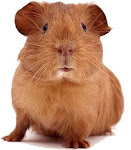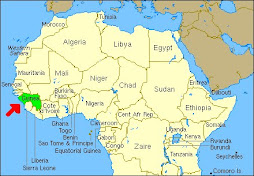So I’m here at my post! Back to the world of trash fires, errant goats and cows, dusty roads, and enthusiastic toothless old men greeting me in languages I don’t know! I’ve taken these first few weeks to do a lot of exploring. Dabola is laid out along a main road, and loosely bordered by “mountains.” It’s got lots of trees! There are endless footpaths that make for great rambling and exploring. Somehow, I feel like I’m noticing things in different ways than I did in Cameroon.
For example, I am obsessing over the mango tree outside my window. If I remember right, mangoes were ready and waiting for my mass consumption by about February in Cameroon. Here, the rainy season is shifted later, and thus, I have to forlornly stare at my mango tree… and wait. Let me assure you, watching mangoes grow is only minimally more riveting than watching grass grow. But I never even noticed the itty-bitty baby mangoes in Cameroon! (Maybe it’s the five mango trees in my compound?) I never noticed when the trees flower, and then the tiny mango, already perfectly shaped, first comes out as small as the nail on your pinky finger. Fascinating. Even if slow-moving.
Another thing I’d failed to notice as closely in Cameroon was the moon. Maybe it’s because my old house had a tin-roofed overhang so I never really saw the moon and stars? And in Dabola, there’s that much less electricity, so when the moon is out, you notice. It is so bright you’d think you could read by its light. And when it is not there, wow, I can’t remember the last time I’d been in such darkness.
And speaking of electricity, I was spoiled in Cameroon. Here, we get electricity starting at about 2pm, in spurts. So I’m learning to adapt my work schedule and entertain myself otherwise!
One thing that’s great for entertainment is that Dabola is so much more open than my part of Cameroon, where everyone lived behind walls, in compounds. Here everyone’s huts are out in the open and it’s fascinating in that just walking around town I can see so much more of people at work and play—women pounding grain, kids running around, men watching TVs that are perched on a stool in the dirt. It also means it’s that much easier to enter into conversations with people, exchange greetings, and just be visible in the community. Oddly (or at least I’m still getting used to it!) so many of the footpaths run straight through people’s compounds—and in this sense, I mean just a family’s grouping of huts. So you troupe right past women cooking, naked children running from their bucket baths—it’s accessible in ways it never was in Cameroon. This morning I walked past a guy eating his morning serving of rice. I greeted him, and he shouted out, “Invitation!” Every one does that here! Any time you’re eating, you’re expected to at least offer to share it… even to strange white people wandering past! (And no, I did not have any, but I have taken other folks up on that when their sauce looks particularly tasty. :)
I live in one of few walled-in compounds (and really I don’t mind the minimal privacy that that affords. And not having to offer my food to every passer-by. :) But another big difference from Cameroon is that in Guinea, the volunteer’s host organization provides your housing. So you really do live like a Guinean, in ways some of us didn’t in Cameroon. There were so many safety regulations in Cameroon, (like you can’t have a thatch-roofed hut cause it’s easier to break into) that a lot a lot of us PCVs lived in the nicest house in the village, just to meet those regulations. (Again, I was spoiled and had a faaat house!) Not in Guinea! Bring on the thatch roofs. It’s pretty cool. I don’t have one, but my closest fellow volunteer does. Although it looks charming, she says that snakes have fallen from it, and it leaks during the rainy season—not fun. As for me, I live in the same compound as the office of my host institution, along with a few other co-workers. I have two small rooms in a row of little apartments—one for the bed and one for cooking and working and everything else. Privacy is not a big part of my life these days. People are always around—so at least on the flip side, it’s good for socializing and easy to hang out with Guineans. And lucky for me, my colleague who is right next door (and whose every word I can hear through the wall) is a really nice single young woman. (She’s my age and not married yet—quite rare by Guinean standards!) She has a TV too, so sometimes in the evenings I go over and watch the Guinean or Ivoirian news or the Latin American imported soap operas, which are just as revered here as they were in Cameroon.
I’ve been able to start my work, visiting village banks and preparing training modules to hopefully help them with some of their operations. The local village bank is open every Wednesday and Friday, is completely volunteer-run, and consists of a table under a veranda on the side of the road. All transactions are recorded manually in a variety of ledgers. When business is slow, there’s always a steady stream of high-schoolers walking by that I can watch. One of the “responsables” of the bank runs a local omelet and tea shack, and he brings us tea and coffee in plastic bags to sip on. (real coffee!! whoa! never saw that in Cameroon!) It’s really pleasant and the folks are very friendly.
And lastly, I’d forgotten to mention I’m named—fully! I took a week to pick a Guinean last name because I wanted to get a feel for the town and the different groups and not pick any name that would label me as the town crazy or reject or anything too offensive. But you’d think my not having a Guinean last name was catastrophic! Guineans I’d meet in town were always asking me about it, and my entire first week, it was a constant topic of discussion among my colleagues. Nabou, my Guinean first name, got turned back into the full Djénabou, yet another version of that name. That’s fine with me— Djénabou is a great name, not too common but everyone knows it, and easy to pronounce (jen-a-boo). So, that first week, it was a constant battle for who would bestow their last name upon me—everyone wants you to give you their name. Mr. Sow would call out, “Djénabou Sow!” And Mr. Coulibaly would say, “Djénabou Coulibaly!” I’d just smile and nod at anything. My counterpart, like everyone who works at my host organization, is a Diallo, so he was all for Djénabou Diallo. It’s a little too much alliteration though and I’d rather add a little diversity to the group instead. When Mr. Diallo saw that he wasn’t getting anywhere with the Djénabou Diallo suggestion, he also proposed the name Sock. He said Sock is a last name that’s from all over Guinea, and it could include people of any tribal group, which is important here! When I explained just what “sock” is in English, holding up my foot as I did so for emphasis, he burst into laughter and it was clear that Djénabou Sock had gone by the wayside. Additionally, I had to tactfully explain why I was not interested in being a Sow. So finally, there’s a name I like, which in Malinké means “take hold of your heritage.” It’s Keïta… pronounced Kate-uh. :) So I’ve gone from Kate to Fleurange in Cameroon to Djénabou in Guinea, now back to Kate…uh. :) And it’s doubly cool because Djénabou is a Pulaar first name, and since Keïta is a Malinké last name, that covers the two big tribal groups in town, so everyone is happy!
More updates from Dabola soon! My love to all!
I'm baaaaaaaack....
14 years ago


No comments:
Post a Comment